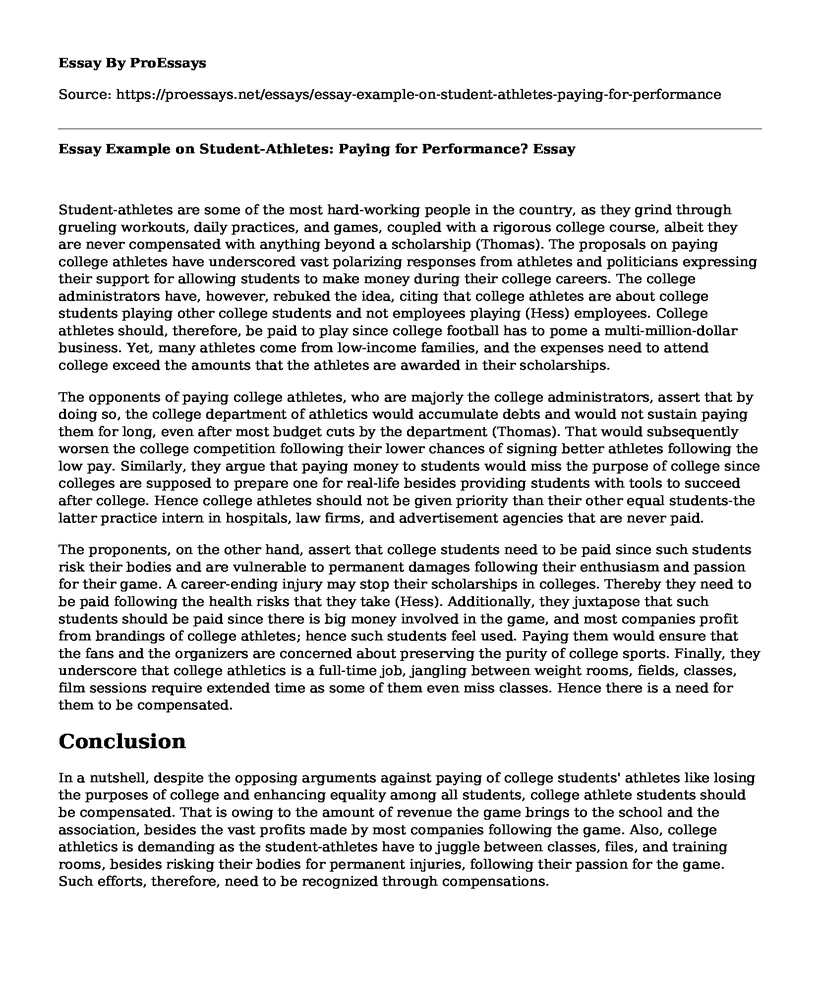Student-athletes are some of the most hard-working people in the country, as they grind through grueling workouts, daily practices, and games, coupled with a rigorous college course, albeit they are never compensated with anything beyond a scholarship (Thomas). The proposals on paying college athletes have underscored vast polarizing responses from athletes and politicians expressing their support for allowing students to make money during their college careers. The college administrators have, however, rebuked the idea, citing that college athletes are about college students playing other college students and not employees playing (Hess) employees. College athletes should, therefore, be paid to play since college football has to pome a multi-million-dollar business. Yet, many athletes come from low-income families, and the expenses need to attend college exceed the amounts that the athletes are awarded in their scholarships.
The opponents of paying college athletes, who are majorly the college administrators, assert that by doing so, the college department of athletics would accumulate debts and would not sustain paying them for long, even after most budget cuts by the department (Thomas). That would subsequently worsen the college competition following their lower chances of signing better athletes following the low pay. Similarly, they argue that paying money to students would miss the purpose of college since colleges are supposed to prepare one for real-life besides providing students with tools to succeed after college. Hence college athletes should not be given priority than their other equal students-the latter practice intern in hospitals, law firms, and advertisement agencies that are never paid.
The proponents, on the other hand, assert that college students need to be paid since such students risk their bodies and are vulnerable to permanent damages following their enthusiasm and passion for their game. A career-ending injury may stop their scholarships in colleges. Thereby they need to be paid following the health risks that they take (Hess). Additionally, they juxtapose that such students should be paid since there is big money involved in the game, and most companies profit from brandings of college athletes; hence such students feel used. Paying them would ensure that the fans and the organizers are concerned about preserving the purity of college sports. Finally, they underscore that college athletics is a full-time job, jangling between weight rooms, fields, classes, film sessions require extended time as some of them even miss classes. Hence there is a need for them to be compensated.
Conclusion
In a nutshell, despite the opposing arguments against paying of college students' athletes like losing the purposes of college and enhancing equality among all students, college athlete students should be compensated. That is owing to the amount of revenue the game brings to the school and the association, besides the vast profits made by most companies following the game. Also, college athletics is demanding as the student-athletes have to juggle between classes, files, and training rooms, besides risking their bodies for permanent injuries, following their passion for the game. Such efforts, therefore, need to be recognized through compensations.
Works Cited
Hess, Abigael. "Majority of College Students Say Student-Athletes Should Be Paid, SurveyFinds." Make it, Sept.2019, https://www.cnbc.com/2019/09/11/student-athletes-shouldget paid-college-students-say.html
Thomas, Brennah. "Pay for Play: Should College Athletes be Compensated?" Bleach Report,Apr.2011, https://bleacherreport.com/articles/654808-pay-for-play-should-collegeathletes-be-compensated
Cite this page
Essay Example on Student-Athletes: Paying for Performance?. (2023, Jun 06). Retrieved from https://proessays.net/essays/essay-example-on-student-athletes-paying-for-performance
If you are the original author of this essay and no longer wish to have it published on the ProEssays website, please click below to request its removal:
- Personal Statement Example
- Intercultural Learning, Global Health, and Nursing: Teaching and Learning Strategies
- Research on Malay Idioms Example
- What Can Be Done to Improve the College Graduation Rate? Essay
- Children Policy on Ohio For Immigrants - Essay Sample
- Essay Sample on Early Childhood Experiences: Parental Influence and Imitation
- Research Paper Example on Innovate & Entrepreneur: The Keys To Success In A Competitive Market







